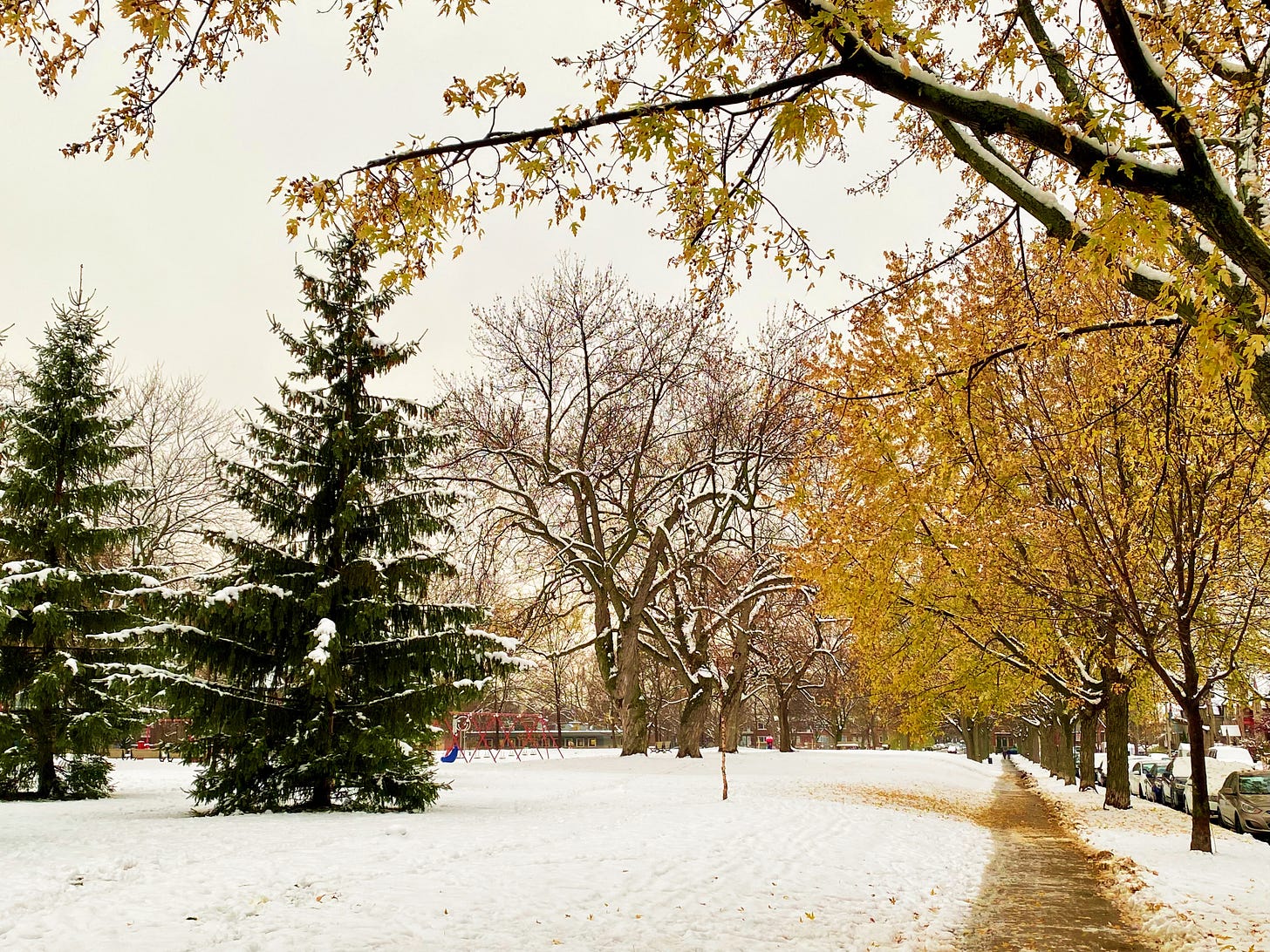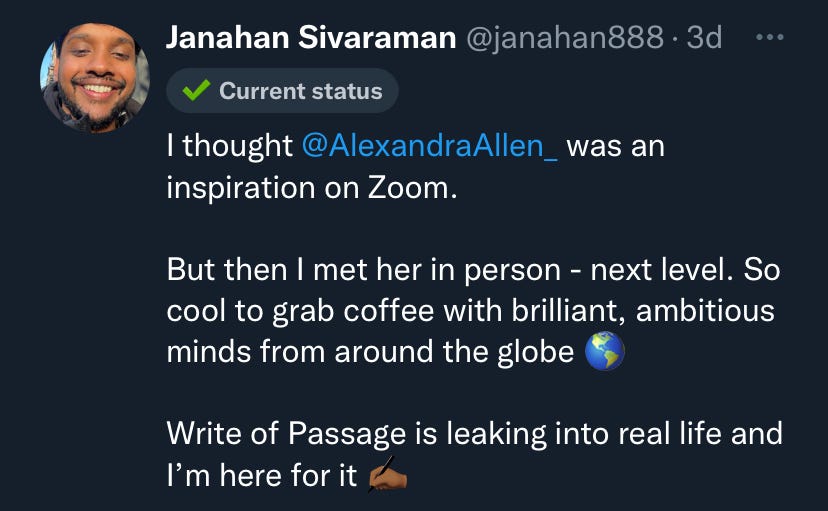Hidden Curriculums & A New Era For Career Development
The lessons students learn from your course curriculum may serve them indefinitely. But the ones they learn from your "hidden curriculum" are guaranteed to serve them throughout their careers.
Thursday took a turn for the spontaneous when a New Yorker friend popped up unexpectedly in Montreal.
Janahan and I met in April through Write of Passage—the online writing course I mentored (for the second time) over the past five weeks. He was on a layover with just enough time to grab coffee. So I rearranged my afternoon and dashed downtown on the metro.
I was all of ten minutes late, yet Janahan had already made friends with the chef at Lili & Oli, the cheerful cafe where we met.
It made me smile because New Yorkers always look right at home in Montreal. Their confident yet chill demeanour and the stylish way they dress make them hard to peg as tourists. And I love that because I love New York.
Janahan and I covered a lot in the hour before his flight. I learned he was born in the US and his family is Sri Lankan. And even though he never spoke it at home, he taught himself Tamil and is now fluent.
We gushed over our mutual friend Louie Bacaj—an engineer turned entrepreneur—and how he inspires us to keep writing. It turns out Louie was Janahan’s former manager at a big tech company in New York—and a great one at that.
Naturally, we asked Janahan’s new chef friend to snap a picture of us to send to Louie. Janahan later posted it on Twitter with this touching message:

I was surprised when over fifty people followed me on Twitter following Janahan’s post (since we both have modest followings). So I joked with Janahan that people must trust his endorsement.
He responded with this beautiful take:
“The reason, I think, is the genuine joy in our faces. Humans are tuned to it.”
Isn’t that deep?
He’s right. Joy is magnetic. And on that note, here are two joyful examples of how teaching online is forging a new era of career development—for both teachers and students.
Two Examples
Global Example
Last week, I dedicated my newsletter to three rising star writers. I featured articles of theirs that had moved me, and the responses I got were incredible.
I was especially thrilled when the friend who recommended the book Educated to me replied saying Yehudis’ account of Leaving Orthodox Judaism has an “uncanny” resemblance to author Tara Westover’s story.
Another gem was from one of the rising stars himself. Ishan, a university student in India, sent me a lovely thank-you message for featuring him. With his permission, I’ve shared a screenshot of his sign-off below:
A thank-you message that expresses gratitude and teaches you a new term of endearment—is there anything more rewarding as a teacher and human being?
Wow. That message went straight to the heart.
It filled me with gratitude for being able to do the work that I do.
What’s wild is during the course of Write of Passage, Ishan and I have exchanged teachings from more than halfway across the world.
I mean, look at the map to let that sink in:
This is the new era of career development—being able to connect with people anywhere there’s Internet.
I often feel “late” or “behind” as a player in the online learning space. But the truth is we’re just on the cusp. The pandemic propelled online learning forward by over a decade compared to its typical growth rate. That means we’re still early. There will be plenty to contribute to this space for years to come. It’s exciting.
Local Example
Local communities benefit from online learning too. Take Montreal, for example. For the past three weeks, I’ve been running online workshops for Concordia University students on how to:
Manage projects
Accelerate teamwork
Collaborate remotely
Students have been tuning into the workshops from all over the city: some from their homes, others from campus, and last week someone took the cake—they tuned in from the metro. Caught in transit, the student had WiFi and decided to join.
When students went into breakouts, I partnered up with her in the main room. I had to laugh when I caught sight of Lionel-Groulx—one of the busiest metro stations—and heard the robotic tone of the intercom announcements.
It’s spectacular that we can scale our teaching to this extent.
I also love how students often connect with me on LinkedIn afterwards to keep in touch. Here’s a lovely message from a student asking for career advice:
I replied to the student instantly to set something up. It’s cool to be able to connect with so many young, ambitious university students so fast. Online learning is a gift to career development—for both teachers and students. I love it.
Hidden Curriculums
By now you get the gist that befriending incredible people like Janahan and Ishan are bonuses of taking a course like Write of Passage. This is where “hidden curriculums” come in.
Every course has a curriculum—the one that serves as a roadmap for the skills you sign up to develop. But what most people don’t realize is every course also has a hidden curriculum: a culmination of life lessons students accrue as a byproduct.
Hidden curriculums represent underlying values modelled throughout a course. They prompt gems of wisdom and heartfelt moments you can’t anticipate because they occur almost as if magically.
They’re the result of interacting with different people in a psychologically safe space—like in my case, having friendly chats with new friends from New York, New Delhi, and numerous places in between.
All of these things compound into hidden curriculums. That’s why students often struggle to pinpoint the source of their transformation during a course. It’s the stuff happening beneath the surface that changes you.
My Challenge to You
You’re a teacher, whether you run courses or not.
You can be a creator, a solopreneur, a manager, or a parent but no matter what you do, your actions speak louder than words.
Take a moment and reflect on who might refer to you as “yaar” (a close friend they admire).
My questions to you are:
What would they deem as your hidden curriculum?
What life lessons do you model without stating outwardly?
How can you be more intentional about your hidden curriculum?
If you have a course or aspire to have one, I recommend giving these questions some serious thought. There are a lot of courses out there. The best way to stand out is to make your hidden curriculum as impactful as your course one.
That’s all for today. Thank you for reading.
If you enjoyed this week’s edition, please like, comment, or share this post with friends. It would help me tremendously in expanding my reach.
Wishing you a wonder-full week,
P.S. Here’s a glimpse of this week’s coworking oasis, Osmo X Marusan Café-Terrasse. The food and drinks are incredible. Consider this your prompt to try out a new coworking space if you’re looking to add some zest to your routine.
P.P.S. I woke up to snow falling and the ground painted white. It’s early—even for Montreal. Check out the photo below.

You can tell by the contrast between the autumn leaves on the right and the barren trees on the left that we’re now between seasons. It feels symbolic to me since I wrapped up a workshop series today and kicked off a new project. Stay tuned for details next week.
All the best until then.






Don't know where to start. "Hidden curriculum ", but the Ishan, Janahan and comments back are some of my favourite reads this week (and the student dialing in from the Metro!)
I'm thinking about the "hidden curriculum" as..."vibe-container-as-a-service." What can I do to elicit helpful emotional states for students, that they can carry with them in their daily lives?